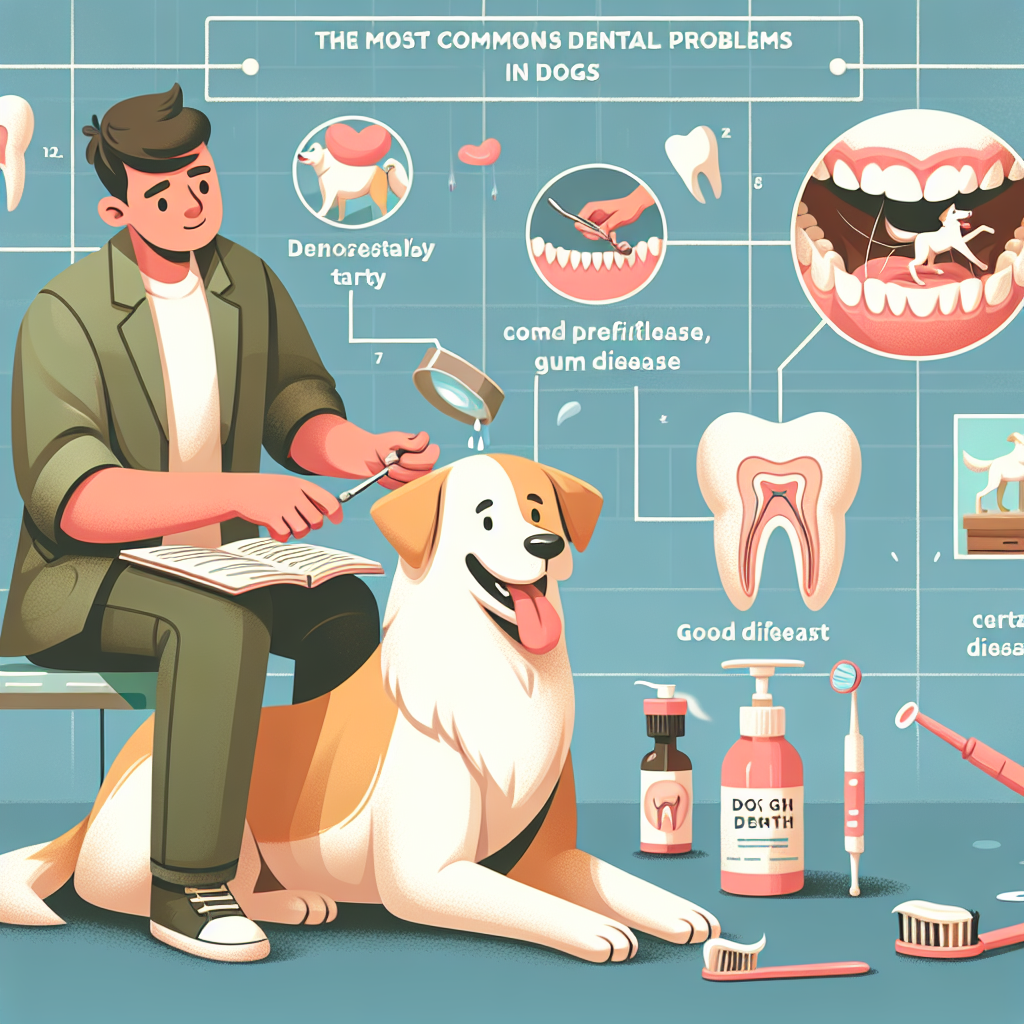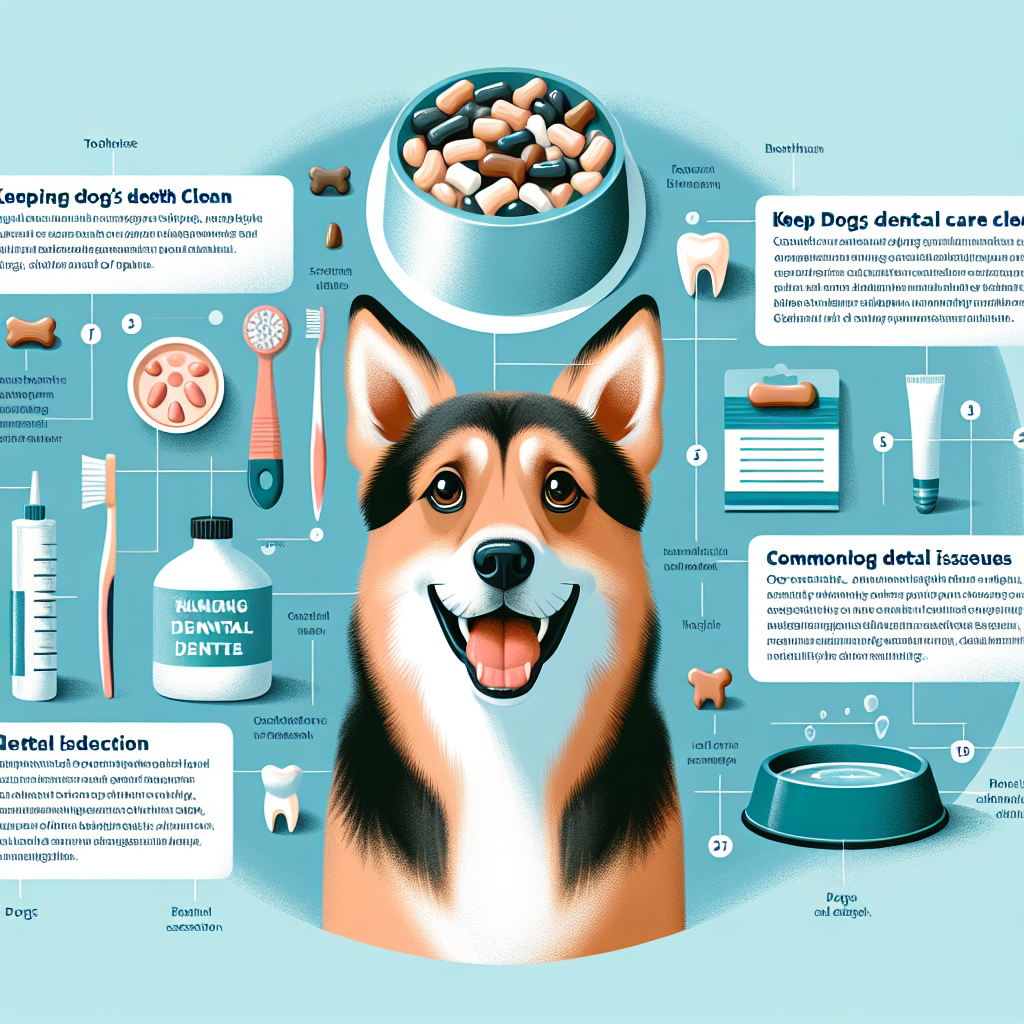Keeping your furry friend’s teeth clean and healthy is essential for their overall well-being. But how exactly can you achieve this? In this article, we will explore several simple yet effective methods to maintain good oral hygiene for your beloved canine companion. From regular brushing to providing dental chews and scheduling professional cleanings, we have got you covered. So let’s dive in and discover the best ways to keep your dog’s teeth in tip-top shape!
Brushing your dog’s teeth
Taking care of your dog’s dental health is just as important as taking care of their overall well-being. One key aspect of maintaining good dental hygiene for your furry friend is brushing their teeth regularly. By incorporating a proper toothbrush and toothpaste, getting your dog accustomed to the routine, using the right brushing techniques, and establishing a frequency for brushing, you can ensure your dog’s teeth stay clean and healthy.
Choosing the right toothbrush and toothpaste
When it comes to selecting a toothbrush for your dog, opt for a toothbrush specifically designed for canine use. These toothbrushes usually feature soft bristles and a long handle to make brushing easier. You can easily find them at pet supply stores or online.
Similarly, it’s essential to choose a toothpaste that is safe for dogs. Avoid using human toothpaste as it can contain ingredients that are toxic to dogs. Instead, look for toothpaste formulated specifically for dogs. Dog toothpaste often comes in appealing flavors like poultry or malt, making it more enjoyable for your furry friend.
Getting your dog accustomed to teeth brushing
Introducing teeth brushing to your dog might take some time and patience, especially if they have never had their teeth brushed before. Start by allowing your dog to familiarize themselves with the toothbrush and toothpaste, letting them sniff and lick them.
Once your dog seems comfortable, place a small amount of toothpaste on the brush and gently lift their lips to access their teeth. Begin by brushing in small circular motions, focusing on the outer surface of their teeth. Gradually increase the time spent brushing as your dog becomes more comfortable with the process.
Proper brushing techniques
To ensure effective cleaning, it’s crucial to use proper brushing techniques. Hold the toothbrush at a 45-degree angle to your dog’s teeth and brush with gentle, circular motions. Pay special attention to the gum line and the back teeth, as these areas are prone to plaque and tartar buildup. Make sure to cover both the outer and inner surfaces of the teeth.
If your dog resists having their teeth brushed, try using your fingers or a finger brush specially designed for dogs. These alternatives can be more comfortable for both you and your furry friend.
Frequency of brushing
Establishing a regular brushing routine is essential for maintaining your dog’s dental health. Aim to brush your dog’s teeth at least two to three times per week. However, for optimal results, daily brushing is recommended. Consistency is key when it comes to preventing dental issues, so try to incorporate teeth brushing into your daily routine.
Alternative dental cleaning options
While regular brushing is highly beneficial for your dog’s dental health, there are also alternative options available to help keep their teeth clean and prevent dental problems. These options include dental chews and treats, water additives and oral sprays, dental wipes and gels, as well as professional dental cleanings.
Dental chews and treats
Dental chews and treats can serve as a great supplement to regular brushing. The chewing action helps remove plaque and tartar buildup, reducing the risk of dental diseases. Look for dental chews and treats that are specifically designed to promote oral health and are approved by veterinary professionals. Opt for options that have a texture that encourages chewing rather than ones that can be easily consumed.
Water additives and oral sprays
Another alternative to regular brushing is the use of water additives and oral sprays. These products are added to your dog’s drinking water or applied directly to their teeth and gums to help combat bacteria and freshen their breath. They can be a convenient solution for maintaining oral hygiene between brushing sessions.
Dental wipes and gels
Dental wipes and gels offer a simple way to clean your dog’s teeth without the need for a toothbrush. With dental wipes, you can gently wipe your dog’s teeth and gums to remove plaque and bacteria. Dental gels, on the other hand, can be applied directly to their teeth and gums to provide a deep clean.
It’s important to note that while these alternative options can be beneficial, they should not replace regular brushing. They can be used in conjunction with brushing to enhance your dog’s dental health.
Professional dental cleanings
Professional dental cleanings performed by a veterinarian are essential for maintaining your dog’s dental health. These cleanings involve a thorough examination, scaling to remove plaque and tartar buildup, and polishing to make the teeth less susceptible to future plaque attachment. While it can be costly, professional dental cleanings are a crucial part of preventative dental care and can help identify any underlying issues that may require further treatment.

Maintaining a healthy diet for dental health
Your dog’s diet plays a significant role in their overall dental health. By choosing appropriate dog food, including dental-friendly snacks, and avoiding harmful human foods, you can help keep their teeth clean and healthy.
Choosing appropriate dog food
When selecting dog food, opt for high-quality options that are specifically formulated to promote dental health. Look for products that have a veterinary dental seal of approval and contain ingredients that support oral hygiene. Dry kibble can be more beneficial for dental health compared to wet food, as the crunchiness helps remove plaque and tartar from the teeth.
Including dental-friendly snacks
In addition to regular dog food, consider incorporating dental-friendly snacks into your dog’s diet. Dental chews, specially formulated treats, and raw bones can help scrape away plaque and tartar while providing a tasty reward. Be sure to choose snacks that are appropriate for your dog’s size and age, and consult with your veterinarian for recommendations.
Avoiding harmful human foods
Certain human foods can be harmful to your dog’s dental health. Avoid feeding them sugary or starchy foods, as these can contribute to plaque and tartar buildup. Additionally, avoid giving your dog hard and brittle foods such as bones that can cause dental fractures or chipped teeth. Always consult with your veterinarian to ensure you are providing a safe and balanced diet for your furry friend.
Promoting chew toys and dental toys
Chew toys and dental toys can be excellent tools for maintaining your dog’s dental health while providing them with mental stimulation and entertainment. Understanding the types of chew toys recommended, considering safety considerations, and recognizing the benefits they offer can help you make informed choices for your dog.
Types of chew toys recommended
When it comes to chew toys, not all are created equal. Look for toys that are specifically designed to promote dental health. Dental chew toys often have ridges or textures that can help remove plaque and massage the gums while your dog chews on them. Rope toys and rubber toys with grooves can also be beneficial for dental health.
Safety considerations for chew toys
While chew toys are beneficial, safety should always be a priority. Opt for toys made from safe materials and avoid toys that can easily break or be swallowed. Choose toys that are appropriate for your dog’s size and supervise them while they chew to prevent any accidents.
Additionally, if your dog has any dental issues or dental work, consult with your veterinarian before introducing chew toys to ensure they are safe and appropriate.
Benefits of dental toys
Dental toys offer several benefits for your dog’s oral health. By encouraging chewing, these toys help remove plaque and tartar buildup, reduce bad breath, and promote healthy gum stimulation. Additionally, chewing on toys can provide mental and physical stimulation, preventing boredom and destructive behavior. Incorporating dental toys into your dog’s routine can be an enjoyable way to maintain their dental hygiene.

Regular oral inspections
Performing regular oral inspections on your dog is essential for maintaining their dental health. By learning how to conduct a thorough examination, detect signs of dental issues, and understand the importance of early intervention, you can address potential problems before they escalate.
How to perform an oral inspection
To conduct an oral inspection, gently lift your dog’s lips and take a close look at their teeth and gums. Look for signs of plaque, tartar, or discoloration, and examine the gums for any redness, swelling, or bleeding. Check for loose or broken teeth, as well as any unusual growths or masses.
It’s crucial to make this examination a positive experience for your dog. Offer praise and rewards during and after the inspection, and gradually increase the duration as your dog becomes more comfortable.
Detecting signs of dental issues
During your oral inspection, be vigilant in identifying any signs of potential dental issues. Common signs include bad breath, excessive drooling, swollen gums, bleeding gums, loose teeth, difficulty chewing, loss of appetite, and changes in behavior. If you notice any of these signs, it’s important to consult with your veterinarian for a proper diagnosis and treatment plan.
Importance of early intervention
Early intervention is key when it comes to dental issues in dogs. Ignoring or delaying treatment can result in more serious problems and discomfort for your furry friend. By regularly inspecting your dog’s mouth and seeking prompt veterinary care if any issues are detected, you can address dental problems early on and prevent them from worsening.
Professional dental exams
In addition to regular oral inspections at home, professional dental exams are vital for your dog’s dental health. These exams, performed by a veterinarian, provide a thorough assessment of your dog’s teeth and gums, allowing for early detection of any dental problems.
Frequency of dental check-ups
The frequency of dental check-ups may vary depending on your dog’s age, overall health, and any existing dental conditions. In general, it is recommended to schedule a dental exam for your dog at least once a year. However, some dogs may require more frequent check-ups, especially if they are prone to dental issues.
Consult with your veterinarian to determine a suitable schedule for your dog’s dental exams based on their individual needs.
What to expect during a dental exam
During a professional dental exam, a veterinarian will conduct a thorough examination of your dog’s teeth and gums, looking for signs of dental disease, decay, or other issues. They may also perform dental X-rays to assess the health of the tooth roots and jawbone.
If necessary, the veterinarian may recommend a professional dental cleaning to remove any plaque or tartar buildup. They may also provide advice on dental care, recommend dental products, and address any concerns you may have regarding your dog’s oral health.
Addressing dental problems
If dental problems or diseases are detected during the exam, your veterinarian will discuss appropriate treatment options with you. This may include professional cleanings, extractions, medications, or additional procedures depending on the severity of the issue. It’s essential to follow your veterinarian’s recommendations to ensure your dog receives the necessary care to maintain their dental health.

Preventing dental diseases
Prevention is always better than cure, and the same applies to dental diseases in dogs. Understanding common dental diseases, implementing preventive measures for tartar and plaque buildup, and effectively managing periodontal disease can help keep your dog’s teeth in top shape.
Understanding common dental diseases in dogs
Dogs are susceptible to various dental diseases, including periodontal disease, tooth decay, and gum infections. Periodontal disease is one of the most common dental issues, characterized by inflammation and infection of the gums and supporting structures of the teeth. This condition can lead to tooth loss, pain, and systemic health problems if left untreated.
Preventive measures for tartar and plaque buildup
Tartar and plaque are major contributors to dental diseases. To prevent their buildup, it’s essential to establish a regular dental hygiene routine for your dog. Regular brushing, using dental chews or treats, and incorporating dental toys can effectively remove plaque and tartar and reduce the risk of dental diseases.
Managing periodontal disease
If your dog develops periodontal disease, proper management is crucial. In addition to professional dental cleanings, your veterinarian may recommend antibiotics or other medications to manage the infection. Regular dental check-ups and at-home care are essential for preventing further progression of the disease.
Supplements for dental health
In addition to regular dental hygiene practices, dental supplements can be a beneficial addition to your dog’s routine. Understanding the types of dental supplements available, considering their benefits and considerations, and consulting with a veterinarian can help you make informed decisions regarding your dog’s dental health.
Types of dental supplements available
There are various dental supplements available in the market that claim to promote oral health in dogs. These supplements can range from oral sprays and powders to dental-specific vitamins and probiotics. Some supplements aim to freshen breath, while others target plaque and tartar reduction. It’s important to choose reputable products and consult with your veterinarian for guidance on which supplements may be suitable for your dog.
Benefits and considerations
Dental supplements can offer additional support to your dog’s dental health routine. They may help freshen breath, reduce plaque and tartar buildup, and support overall oral health. However, it’s crucial to remember that supplements should not replace regular brushing or professional dental care. They should be used in conjunction with other dental hygiene practices as recommended by your veterinarian.
Consulting with a veterinarian
Before introducing any dental supplements, it’s always best to consult with your veterinarian. They can assess your dog’s individual needs, provide recommendations specific to your dog’s health, and ensure the supplements you choose are safe and effective. Your veterinarian is the best resource for guidance on maintaining your dog’s dental health.

Home remedies for dental care
While professional dental care and regular oral hygiene practices are crucial, some home remedies can help support your dog’s dental health. Understanding natural remedies for dog dental care, dealing with bad breath, and recognizing the limitations of home remedies can provide additional insights into promoting oral hygiene.
Natural remedies for dog dental care
Several natural remedies can help maintain your dog’s dental health. Raw carrots or apples can serve as natural teeth-cleaners and promote chewing. Some dog-safe herbs, like parsley or peppermint, can also help freshen breath.
Additionally, incorporating foods rich in antioxidants and omega-3 fatty acids, such as blueberries or fish oil, may support overall oral health. However, it’s important to note that natural remedies should not replace regular brushing or professional dental care, and their effectiveness may vary.
Dealing with bad breath
Bad breath in dogs can be a common issue and may indicate underlying dental problems. To address bad breath, it’s essential to maintain regular dental hygiene practices and seek veterinary advice if the problem persists. Additionally, some natural remedies, such as adding a small amount of coconut oil to your dog’s food or using parsley as a breath freshener, may temporarily alleviate bad breath.
Limitations of home remedies
While home remedies can provide some benefits, it’s important to recognize their limitations. Home remedies should not replace regular veterinary care, professional dental cleanings, or daily dental hygiene practices. They may offer temporary relief or serve as additional support, but they are not a substitute for proper dental care tailored to your dog’s specific needs.
Maintaining proper oral hygiene
In addition to the specific practices discussed earlier, there are some general measures you can take to maintain proper oral hygiene for your dog. Cleaning food and water bowls regularly, taking care of dog gums, and promoting overall oral health will contribute to your dog’s dental well-being.
Regular cleaning of food and water bowls
Food and water bowls can accumulate bacteria, which can contribute to dental issues. Wash your dog’s food and water bowls regularly, preferably with warm, soapy water, to remove any residue or bacteria.
Taking care of dog gums
Gum health is vital for overall oral health. Gently massage your dog’s gums using a soft finger brush or your clean finger to stimulate blood circulation and keep the gums healthy. Healthy gums should be pink and firm. If you notice any changes, such as redness, swelling, or bleeding, consult with your veterinarian.
Promoting overall oral health
Maintaining your dog’s dental health goes hand in hand with promoting their overall well-being. Ensure your dog receives regular veterinary check-ups, a balanced diet, and plenty of exercise. Good overall health can indirectly contribute to healthy teeth and gums.
By following these practices and staying proactive about your dog’s dental care, you can keep their teeth clean and healthy and ensure they enjoy a lifetime of happy smiles. Remember to consult with your veterinarian for professional advice tailored to your dog’s unique needs, and always prioritize their dental health as an essential part of their overall care.





